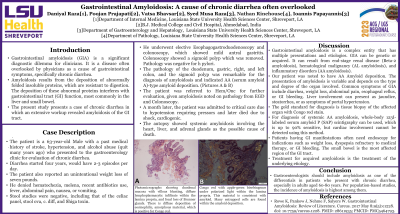Tuesday Poster Session
Category: Colon
P3076 - Gastrointestinal Amyloidosis: A Cause of Chronic Diarrhea Often Overlooked
Tuesday, October 24, 2023
10:30 AM - 4:00 PM PT
Location: Exhibit Hall

Has Audio
.jpeg.jpg)
Daniyal Raza, MD
LSU Health Sciences Center
Shreveport, LA
Presenting Author(s)
Daniyal Raza, MD1, Poojan Prajapati, MBBS2, Vatsa Bhavsar, MBBS3, Syed Musa Raza, MD1, Nathan Rhinehouse, MD1, Ioannis Papayannis, MD1
1LSU Health Sciences Center, Shreveport, LA; 2B.J. Medical College, Ahmedabad, Gujarat, India; 3B.J. Medical College, Shreveport, LA
Introduction: Gastrointestinal amyloidosis (GIS) is a diagnostic dilemma often overlooked by physicians as a cause of chronic diarrhea and other gastrointestinal symptoms.GIS occurs when abnormally folded insoluble proteins, resistant to digestion, accumulate and interfere with the function of the gastrointestinal tract, primarily affecting the liver and small bowel. We presents a case of chronic diarrhea in which extensive work up revealed amyloidosis of the GI tract.
Case Description/Methods: A 63-year-old male with history of past alcohol abuse presented with chronic diarrhea, occurring 2-3 times per day for four years, accompanied by unintended weight loss of 7 pounds. He denied hematochezia, melena, recent antibiotics use, abdominal pain, nausea or vomiting. Stool studies were negative.The patient had an elective EGD and colonoscopy. The EGD revealed antral gastritis, while the colonoscopy removed a sigmoid polyp. Biopsy confirmed AA-type amyloid deposition in the duodenum, stomach, colon, and sigmoid polyp, indicating a diagnosis of amyloidosis. The patient was referred to Hematology/Oncology for further evaluation but later experienced critical care admission due to hypotension requiring pressors. Unfortunately, the patient passed away due to cardiogenic shock. Autopsy revealed systemic amyloidosis affecting the heart, liver, and adrenal glands as the likely cause of death.
Discussion: Amyloidosis can be genetic or acquired, associated with conditions like end-stage renal disease (Beta-2 amyloidosis), hematological malignancy (AL amyloidosis), or inflammatory disorders (AA amyloidosis). In this case, the patient had AA amyloid deposition, indicating an inflammatory association. Amyloidosis presentations vary depending on organ involvement. In GIS, common symptoms include diarrhea, weight loss, abdominal pain, reflux, and GI bleeding. Definitive diagnosis involves a tissue biopsy stained with Congo red stain. However, due to the nonspecific symptoms, patients often undergo extensive testing before a biopsy is performed. To diagnose systemic AA amyloidosis, whole-body 123I-labeled serum amyloid P (SAP) scintigraphy can be used, which has a sensitivity of up to 90%. However, it does not detect cardiac involvement. Patients with GI manifestations often require endoscopy if they experience weight loss, unresponsive dyspepsia, or GI bleeding. The small bowel is commonly affected in GI amyloidosis. Treatment for acquired amyloidosis involves addressing the underlying cause.

Disclosures:
Daniyal Raza, MD1, Poojan Prajapati, MBBS2, Vatsa Bhavsar, MBBS3, Syed Musa Raza, MD1, Nathan Rhinehouse, MD1, Ioannis Papayannis, MD1. P3076 - Gastrointestinal Amyloidosis: A Cause of Chronic Diarrhea Often Overlooked, ACG 2023 Annual Scientific Meeting Abstracts. Vancouver, BC, Canada: American College of Gastroenterology.
1LSU Health Sciences Center, Shreveport, LA; 2B.J. Medical College, Ahmedabad, Gujarat, India; 3B.J. Medical College, Shreveport, LA
Introduction: Gastrointestinal amyloidosis (GIS) is a diagnostic dilemma often overlooked by physicians as a cause of chronic diarrhea and other gastrointestinal symptoms.GIS occurs when abnormally folded insoluble proteins, resistant to digestion, accumulate and interfere with the function of the gastrointestinal tract, primarily affecting the liver and small bowel. We presents a case of chronic diarrhea in which extensive work up revealed amyloidosis of the GI tract.
Case Description/Methods: A 63-year-old male with history of past alcohol abuse presented with chronic diarrhea, occurring 2-3 times per day for four years, accompanied by unintended weight loss of 7 pounds. He denied hematochezia, melena, recent antibiotics use, abdominal pain, nausea or vomiting. Stool studies were negative.The patient had an elective EGD and colonoscopy. The EGD revealed antral gastritis, while the colonoscopy removed a sigmoid polyp. Biopsy confirmed AA-type amyloid deposition in the duodenum, stomach, colon, and sigmoid polyp, indicating a diagnosis of amyloidosis. The patient was referred to Hematology/Oncology for further evaluation but later experienced critical care admission due to hypotension requiring pressors. Unfortunately, the patient passed away due to cardiogenic shock. Autopsy revealed systemic amyloidosis affecting the heart, liver, and adrenal glands as the likely cause of death.
Discussion: Amyloidosis can be genetic or acquired, associated with conditions like end-stage renal disease (Beta-2 amyloidosis), hematological malignancy (AL amyloidosis), or inflammatory disorders (AA amyloidosis). In this case, the patient had AA amyloid deposition, indicating an inflammatory association. Amyloidosis presentations vary depending on organ involvement. In GIS, common symptoms include diarrhea, weight loss, abdominal pain, reflux, and GI bleeding. Definitive diagnosis involves a tissue biopsy stained with Congo red stain. However, due to the nonspecific symptoms, patients often undergo extensive testing before a biopsy is performed. To diagnose systemic AA amyloidosis, whole-body 123I-labeled serum amyloid P (SAP) scintigraphy can be used, which has a sensitivity of up to 90%. However, it does not detect cardiac involvement. Patients with GI manifestations often require endoscopy if they experience weight loss, unresponsive dyspepsia, or GI bleeding. The small bowel is commonly affected in GI amyloidosis. Treatment for acquired amyloidosis involves addressing the underlying cause.

Figure: Congo red with apple-green birefringence
under polarized light within the lamina
propria
under polarized light within the lamina
propria
Disclosures:
Daniyal Raza indicated no relevant financial relationships.
Poojan Prajapati indicated no relevant financial relationships.
Vatsa Bhavsar indicated no relevant financial relationships.
Syed Musa Raza indicated no relevant financial relationships.
Nathan Rhinehouse indicated no relevant financial relationships.
Ioannis Papayannis indicated no relevant financial relationships.
Daniyal Raza, MD1, Poojan Prajapati, MBBS2, Vatsa Bhavsar, MBBS3, Syed Musa Raza, MD1, Nathan Rhinehouse, MD1, Ioannis Papayannis, MD1. P3076 - Gastrointestinal Amyloidosis: A Cause of Chronic Diarrhea Often Overlooked, ACG 2023 Annual Scientific Meeting Abstracts. Vancouver, BC, Canada: American College of Gastroenterology.
